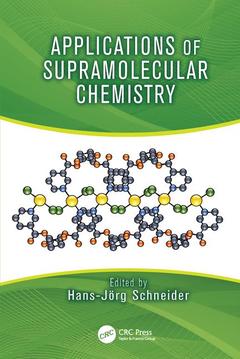Description
Applications of Supramolecular Chemistry
Coordinator: Schneider Hans-Jorg
Language: English
Subjects for Applications of Supramolecular Chemistry:
Keywords
pUC18 DNA; Separation Technology; T2 Agent; Supramolecular Electronics; Ethylene Glycol Dimethacrylate; Intelligent Materials; American Chemical Society; Biotechnology; Molecular Imprinting; 3MLCT State; Angewandte Chemie; Supramolecular Interactions; Field Effect Transistor; Supramolecular Complexation; Polymeric ISE Membrane; Boronic Acid; Crown Ethers; Supramolecular Polymers; Recognition Unit; Host Compounds; HTS; Si Si Si Si Si; Supramolecular Hydrogels; Photocleave DNA; Dp P0; Gadolinium Complexes; Monomer Monomer Interactions; Field Effect Transistors; Supramolecular Aggregates
Publication date: 11-2016
· 15.6x23.4 cm · Paperback
Publication date: 04-2012
454 p. · 15.6x23.4 cm · Hardback
Description
/li>Contents
/li>Readership
/li>Biography
/li>
Applications of Supramolecular Chemistry introduces the use of non-covalent interactions and molecular recognition for many fields. Applications include the analysis of technically, medically, and environmentally important chemical compounds, their separation, purification and removal, and the design of new materials, including supramolecular electronics. The book also explores biological interactions and applications in the food and textile industries.
Introduction and Overview. Inorganic Analytes and Sensors. Organic and Biological Analytes. Potentiometric Ion Sensors: Host–Guest Supramolecular Chemistry in Ionophore-Based Ion-Selective Membranes. Supramolecular Self-Assembly Governed Molecularly Imprinted Polymers for Selective Chemical Sensing. Supramolecular Chromatography. Industrial and Environmental Applications: Separation and Purification. Chemomechanical Materials. Supramolecular Structures in Organic Electronics. Molecular Tectonics: An Approach to Crystal Engineering. Supramolecular Complex Design and Function for Photodynamic Therapy and Solar Energy Conversion via Hydrogen Production: Common Requirements for Molecular Architectures for Varied Light-Activated Processes. Supramolecular Polymers. Supramolecular Hydrogels for Soft Nanotechnology. Supramolecular Drug-Delivery Systems. Proteins and Nucleic Acids Targeting. Gadolinium(III) Complexes–Based Supramolecular Aggregates as Magnetic Resonance Imaging Contrast Agents. Applications in the Food and Textile Industries. Index.
Hans-Jorg Schneider is a Professor of Organic Chemistry at the Universitat des Saarlandes, Germany.
These books may interest you

Synergy in Supramolecular Chemistry 220.72 €



